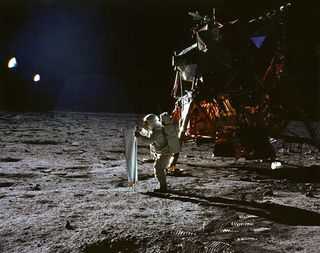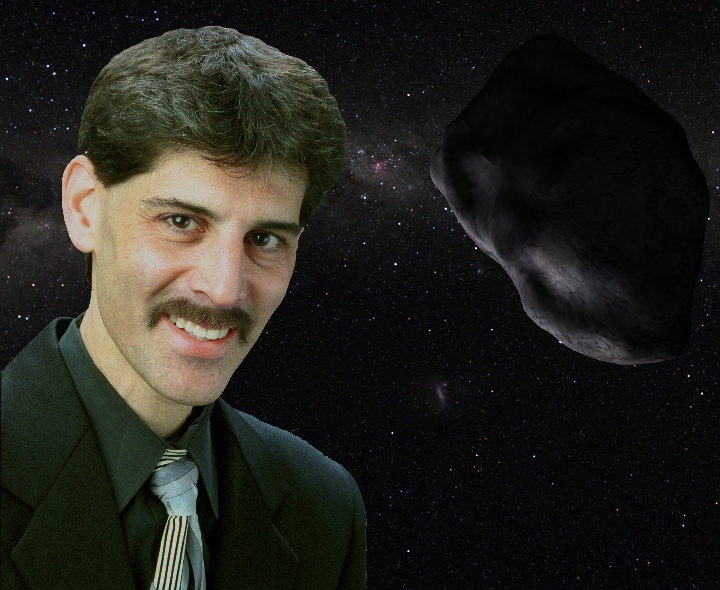Ann Druyan: How to Sail Beyond the Moon Landings

Forty years after the first moon landing on July 20, 1969, SPACE.com asked Apollo astronauts and leaders of the space community to ponder the past, present and future. Writer-producer Ann Druyan, widow of famed astronomer Carl Sagan, discusses why the United States has lost its space nerve, the importance of pure science, and why solar sailing is the wave of the future:
SPACE.com: What kind of space missions do you think America should be pursuing?
Ann Druyan: I can think of literally a hundred different missions that it would be wonderful to see unfold. Some missions that we have recently launched — Kepler comes to mind; I actually went to the launch — are very promising and I think exactly the right kind of science.
If Carl were alive today, I think he would have just absolutely been thrilled about a NASA mission to search for other Earth-like planets. That's definitely the right stuff.
Also, I think that it's true that even though robotic missions make the most sense, both in terms of the economics and in terms of the safety of the humans, I think it's also true that it's the drama of space exploration that motivates people to do the hard work necessary to learn these difficult subjects like math and science in order to participate in this kind of exploration.
And so I'm hoping that there will be some kind of reasonable, thoughtful, long-term manned programs of exploration.
S: Do you have any particular space endeavors in mind?
Get the Space.com Newsletter
Breaking space news, the latest updates on rocket launches, skywatching events and more!
A: I would love to see personally — and have been working as hard as I can on the notion of — solar sailing. This is something that could be tremendously cost-effective, because solar sailing is a way to move through the cosmos at speeds unprecedented. You know Voyager moves at 38,000 miles an hour, which is very impressive and extremely fast to us. But of course the cosmos is so very big that that won't get you very far. Solar sailing is a way to move ten times faster.
I've been working with the Planetary Society for the last decade trying to launch a solar sailing mission precisely because I believe it would be a Kitty Hawk moment for space exploration. It would thrill me to see a very ambitious program of solar sail research, because I think that that would give us an edge, and I think we want that feeling again of being on the cutting edge.
S: How is America doing in science; are we still on the cutting edge?
A: When I was growing up, that was the feeling about our society - we could do the impossible; certainly [during] the Apollo missions, which we're all thinking about especially now this summer because of the significant anniversary that's coming up.
Even if you were a person who was completely and totally opposed to so much of American policy — as I was at that time — it was the mythic achievement of Apollo that was a source of pride to everyone. I think it wasn't just Americans, it was humans, too, and I think we need to rekindle that spirit of being able to do what no one else has done before.
A cursory study of history will reveal that we have these periods of creativity and rebirth, alternating with periods of the retreat from knowledge and reality. And so, I'm hoping that we are on the eve of a new age of wonder, and skepticism, if I can say that without sounding contradictory.
I always liked the metaphor of the toddler — having raised a couple of kids myself — who is making their first foray out away from the safety of his or her mother's skirts. They dart out maybe 10, 20 feet away, and then they realize that they're separated from their mother and they come scurrying back. And they are even a little more clingy than they were before, before they make their next foray out.
And that's a perfect metaphor in my view to our own space age. You know, we've made our first forays out, and they were thrilling, but terrifying in some way. And we come scurrying back. And due to a series of historical events that sent us back into fear-based politics, and fear-based religion, we lost our nerve.
But now is a time for nerve. And not the kind of nerve that makes you go to war idiotically, but the kind of nerve that takes you forward, another baby step, into the Cosmos.
S: In your view, does America's spaceflight program have the right balance of adventure and discovery?
A: I don't know if I'm enough of an expert to pass judgment. I do know that I was very impressed with the recent repair of Hubble. But I think the history of human space exploration has been somewhat light on the science, and has always, it seems to me, erred too much on the side of other imperatives.
I think the more science, the better. Because the thing about the science, as we've seen from the amazing work of James Faraday, of Maxwell, of so many others in the history of science, is that pure scientific research can change and even create vast amounts of wealth for us.
The Maxwell equations begin as an exercise in mathematics, how to make an equation more beautiful. And they end by completely creating, singlehandedly, the communications revolution that has made our age.
So I know if there could be more direct investment in science, letting science go where it will, that the output, the impact on our civilization would be manifold to what we invest in it, in the most positive way. So if we're going to be smart, we're going to put a lot of money in pure science, and let the revelations unfold.
Forty years after astronauts first set foot on the moon, SPACE.com examines what we've done since and whether America has the right stuff to get back to the moon by 2020 and reach beyond. For exclusive interviews and analysis, visit SPACE.com daily through July 20, the anniversary of the historic landing.
Join our Space Forums to keep talking space on the latest missions, night sky and more! And if you have a news tip, correction or comment, let us know at: community@space.com.
Dave Brody has been a writer and Executive Producer at SPACE.com since January 2000. He created and hosted space science video for Starry Night astronomy software, Orion Telescopes and SPACE.com TV. A career space documentarian and journalist, Brody was the Supervising Producer of the long running Inside Space news magazine television program on SYFY. Follow Dave on Twitter @DavidSkyBrody.

